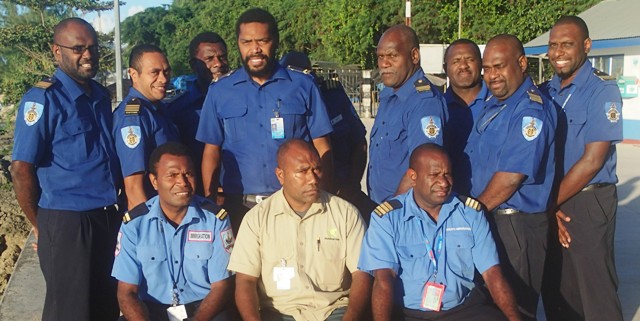
Customs has also finalised a Standard Operating Procedure for Small Craft Controls and is delivering trainings to Customs Officers in Tanna, Vila and Santo. Thursday this week saw Immigration and Bio-Security Officers joining Customs at the first of these trainings.
These initiatives are timely in that they coincide with a visit to Fiji this week by Jeremy Douglas of the United Nations’ Office on Drugs and Crime. Mr Douglas highlighted to Fiji officials the need to watch borders and tighten bank controls in order to combat the growing use of the Pacific’s island states by drug traffickers and money launderers. The same applies to Vanuatu as much as to any other Pacific Island nation.
Vanuatu Customs’ Notice to Masters makes it clear that there are only four ports of entry and departure in Vanuatu: Lenakel (Tanna Island), Port Vila (Efate Island), Luganville (Santo) and Sola (Vanua Lava in the Banks and Torres Group). Masters of all yachts entering Vanuatu from a foreign port must first report to Quarantine, Customs and Immigration at one of these ports to obtain inwards clearance.
Vessels may not call at Mystery Island (Aneityum), Port Resolution (Tanna) or any other place in Vanuatu unless the Director of Customs & Inland Revenue grants prior written permission. Masters of vessels who visit these places prior to obtaining inwards clearance and being issued with an “Inter-island Cruising Permit”, or obtaining written permission may be subject to fines and/or prosecution.
Some of the new penalties are stiff so it is well that intending visitors are made aware of what they are in for if they do the wrong thing.
Customs requires 24 hours prior notice of arrival of any vessel by e-mail stating the expected arrival time of the vessel, where it has come from, the crew and passengers on board and the port at which it will arrive. According to Quarantine laws, the vessel is required to fly the yellow flag as soon as it enters Vanuatu’s exclusive economic zone. And upon arrival at the port, vessels can call “Customs” on VHF radio Channel 16 (only at Port Vila at the moment) to be cleared.
Interactive Arrival and Departure forms will shortly be available on the Customs website. These can be filled out electronically and e-mailed to Customs to facilitate both inwards and outward clearances.
The electronic forms will not only allow Customs to conduct risk assessments prior to the vessel’s arrival, but also allow for a smooth arrival and departure clearance for legitimate vessels and travelers. All attempts will be made to board vessels arriving from overseas as soon as possible after their actual arrival although clearance outside of normal working hours for either arriving or departing vessels will be subject to overtime attendance fees.
On completion of arrival formalities at the Port of Entry the Master of any vessel wishing to visit other islands in Vanuatu must first apply to Customs for an “Inter-island Cruising Permit”. For genuine cruising small craft wishing to visit more remote and isolated destinations in Vanuatu these permits may be issued for a period of up to six months and absolve the vessel from reporting to Customs until the port of departure for overseas or for application to extend the permit.
Other requirements for small craft visiting Vanuatu are that firearms and ammunition on board arriving vessels must be declared to the Customs Officer. Unless Customs is satisfied that these items (excluding automatic weapons which are banned entirely) can be safely secured under seal on board the vessel or they must be surrendered to Customs for safe keeping for the duration of the vessel’s stay in Vanuatu. Vessels so affected must give Customs at least 48 hours notice of intended departure from its final port of clearance.
Besides automatic firearms, Vanuatu’s laws also prohibit the importation of narcotics, obscene publications and materials (books, magazines, DVDs, computer stored images and videos, and video cassettes. There are severe penalties for any breach of these prohibitions.
No live animals, reptiles, birds of any description, fresh meat, fruit or vegetables imported by yachts may be taken ashore. Officers of Bio-security may enforce some restriction on whether such goods will be permitted to remain on board after the yacht’s arrival.
No foreign garbage may be landed in Vanuatu without permission from Bio-security.
Visiting yachts may enter and remain temporarily in Vanuatu without payment of Customs duty for a period not more than six (6) months in any period of not more than (2) years provided that the vessel is the property of, or has been hired by, the importer.
Duty will become payable if the vessel stays longer than the time stipulated above, or is used commercially in any way including chartering or hiring or for activities for which a charge is made such as for sailing tours.
The only exception is if the vessel falls within the definition of a “super yacht” (a vessel valued in excess of Vt 200 M or approximately US$2,000,000) for which special conditions apply. Details are on Customs’ website.
Customs’ duty will also become payable if the vessel is disposed of in Vanuatu whether or not for financial consideration or if it is imported by a resident of Vanuatu or a person taking up residence in Vanuatu after the 6 months concession period of obtaining residency permit (as per the Import or Duties (Amendment) Act) has expired.
All visiting small craft are liable for Port Dues of Vt 7,875 for 30 days or part thereof and Vt 100 per day thereafter. These fees are to be paid at the Ports and Harbours office, or if unavailable, at the Customs office at the final port of departure.
Customs’ allowances for crew and passengers include personal effects such as clothing; toiletries and jewelry possessed and used abroad not intended for gift, sale or disposal to any other person.
Each crew or passenger over the age of 18 years is allowed 250 cigarettes, or 100 cigarillos, or 50 cigars, or 250 grams of tobacco, 2 litres of wine and 1.5 litres of spirits, ¼ litres of toilet water and 10 centilitres of perfume plus any other item (other than prohibited goods) up to a value of 50,000 vatu per person aged over 15 years.
All yachts leaving Vanuatu for a foreign port or place are required to obtain an outward clearance from Customs at the final port of departure: Lenakel, Port Vila, Luganville or Sola and must depart for overseas within 24 hours of its issue. Vessels wishing to obtain clearance at locations other than these ports should obtain permission from Customs and Immigration in advance. Fees for official attendance and travel may apply if such a request is granted.
No yacht is allowed to call at any place in Vanuatu once an outward International Clearance has been given.
Duty–free goods and fuel may be shipped on board any vessel clearing outwards for a foreign port or place. Details may be obtained from Customs offices.
Customs’ normal operating hours are 0730 – 1200 and 1300 – 1630 Monday to Friday.
Between 06:00 - 07:30 and 16:30 - 18:00 Monday to Friday there is a fee of VT 1,000 per hour per officer.
From 1800 to 0600 the fee is VT 1,500 per hour per officer and on weekends and public holidays VT 2,000 per officer.
A minimum charge of 3 hours is applicable for all out of normal hours attendances.
The full text of the Notice to Masters can be found at:
http://customsinlandrevenue.gov.vu/index.php/travellers/yacht-clearance
You can listen to Radio Australia’s report on the UN Drugs and Crime Office visit to Fiji at:





